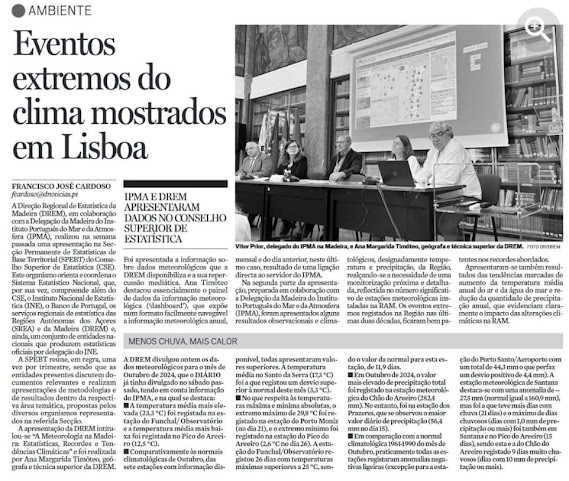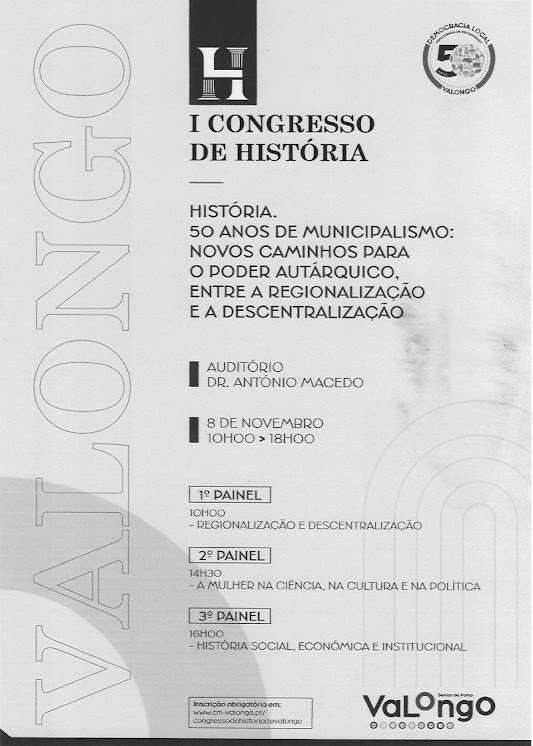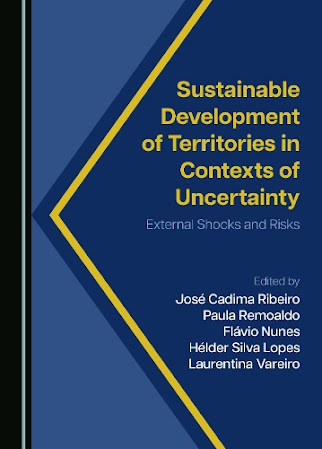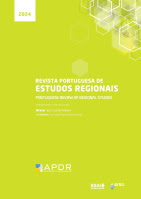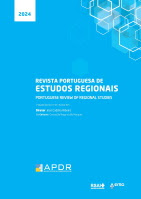Espaço de divulgação e debate de ideias relativas ao planeamento do território, à economia do turismo e ao desenvolvimento regional.
sábado, dezembro 21, 2024
quinta-feira, dezembro 19, 2024
terça-feira, dezembro 17, 2024
sexta-feira, dezembro 13, 2024
segunda-feira, dezembro 02, 2024
domingo, dezembro 01, 2024
quinta-feira, novembro 21, 2024
quarta-feira, novembro 20, 2024
quinta-feira, novembro 07, 2024
domingo, novembro 03, 2024
PASOS - Revista de Turismo y Patrimonio Cultural: Vol. 22, Núm. 4 (2024)
Vol. 22 Núm. 4 (2024): PASOS Revista de Turismo y Patrimonio Cultural
https://ojsull.webs.ull.es/index.php/Revista/issue/view/109
sábado, novembro 02, 2024
Capítulo de livro: “Experiências Sensoriais e Emoções no Caminho Português de Santiago (Caminho Central), e Deficiências de Dotação em Equipamento"
“Experiências Sensoriais e Emoções no Caminho Português de Santiago (Caminho Central), e Deficiências de Dotação em Equipamento”, in Atas do 6.º Congresso Internacional Casa Nobre – Um Património para o Futuro, Joana Lencart, Nuno Soares, Armando Malheiro da Silva, Luís Damásio e João Carlos Gachineir (Coord.), Edição da Município de Arcos de Valdevez, outubro de 2024, pp. 622-636 (trabalho em co-autoria);
https://drive.google.com/drive/folders/12Xv5YBVCr4p59S7b1U4D231oKoo6Q4MN
sábado, outubro 19, 2024
“Residents’ perceptions of tourism development in the context of a new governance framework for Portuguese protected areas: The case of a small peripheral natural park”, Journal of Rural Studies, Vol. 112, dezembro de 2024, pp. 103451,
Abstract
https://authors.elsevier.com/c/1jyTr2eyKFvNR-
sexta-feira, outubro 11, 2024
Journal of Rural Studies: paper accepted
"Residents’ Perceptions of Tourism Development in the Context of a New Governance Framework for Portuguese Protected Areas: The Case of a Small Peripheral Natural Park" - title of the paper to be published online soon
https://www.sciencedirect.com/journal/journal-of-rural-studies
segunda-feira, setembro 23, 2024
2º Encontro de Editores de Revistas Académicas em Ciências Sociais e Humanas
Aproximando-se a realização do 2º Encontro de Editores de Revistas Académicas em Ciências Sociais e Humanas (ERACSH), partilhamos hiperligação para o programa definitivo do mesmo, anexando cartaz e convite.
terça-feira, setembro 17, 2024
domingo, setembro 15, 2024
Peso das exportações de turismo no PIB em Portugal (9,5%, em 2023)
quinta-feira, setembro 12, 2024
sexta-feira, agosto 30, 2024
“Residents’ Perceptions of Tourism Development in the Context of a New Governance Framework for Portuguese Protected Areas: A Case Study”
Abstract
Historically, Portuguese protected areas (PAs) have been operating under top-down governance, often neglecting local communities. In 2019, the Portuguese government established a new governance model for PAs, based on co-management. The new co-management approach emphasizes collaborative and participatory governance and positions sustainable tourism as a catalyst for territorial revitalization and local development. However, local communities’ attitudes and perceptions regarding tourism in these areas remain largely uncharted. This study focuses on the Alvão Natural Park (PNAL), a small rural and mountainous Portuguese PA, which is currently in the early stages of co-management implementation. Our goal was to investigate local residents' perceptions of tourism's impacts and identify potential divergence among resident groups and their level of support for tourism development. These insights are pivotal because the active engagement of local communities is a key element for sustainable tourism development and the successful implementation of co-management. The study employed a self-administered survey, garnering responses from 250 PNAL residents representing over half of the park's population. Factor analysis identified four primary perceptual dimensions and cluster analysis classified residents into three distinct groups based on their tourism perceptions. While most PNAL residents express support for tourism development, there is a resounding call for new policies to revert the legacy of top-down governance. This research provides essential insights for shaping effective tourism policies, planning and development strategies, and ensuring the active involvement of local communities in co-management and sustainable development efforts within the PNAL. Moreover, this study demonstrates the applicability of this research approach in the context of evolving governance models with the potential for adaptation to other PAs across Portugal and other countries undergoing similar governance transitions.
Keywords: protected area; local communities; co-management; sustainable tourism development; Portugal
Luís Filipe Silva
José Cadima Ribeiro
Francisco Carballo-Cruz
(Comunicação apresentada no 63rd ERSA Congress (2024), organizado pela European Regional Science Association, de 26 a 30 de agosto de 2024, na Ilha Terceira, Açores, Portugal)
segunda-feira, agosto 19, 2024
“Motivation-Based Visitor Segmentation in the Context of a New Governance Model for a Protected Area”
ABSTRACT
Understanding visitor motivations is crucial for developing sustainable tourism strategies in protected areas (PAs). However, the literature often overlooks the role of visitor motivation research in enhancing place-based collaborative governance within PAs. This study focuses on the Alvão Natural Park (PNAL), a mountainous Portuguese PA currently implementing a new co- management model. This represents a significant change, considering that the governance of the PA has shifted from a single state entity to a collaborative model that prioritises tourism as a key factor in local development. This study seeks to address the research gap regarding motivation-based segmentation studies in mountainous natural parks, while exploring the innovative aspects of conducting such a study within the framework of a new governance model. By surveying 351 PNAL visitors, factor analysis revealed four motivational dimensions with emphasis on connection with nature and relaxation. However, cluster analysis identified only one segment primarily motivated by connecting with nature, while the largest segment is motivated by convenience and social environment interactions. The results suggest the importance of involving the local community in governance and decision-making processes, and the need to prioritise ecotourism as a key focal point in PNAL’s tourism policies, strategic planning, and development. Our f indings contribute to theoretical knowledge and inform policy- making, providing valuable guidance for the successful implementation of co-management in PNAL and potentially other similar PAs.
Luís Filipe Silva,
José Cadima Ribeiro
Francisco Carballo-Cruz
NIPE and School of Economics and Management, University of Minho, Braga, Portugal
[Resumo de artigo publicado "online" em 2024/08/18, Journal of Policy Research in Tourism, Leisure and Events]
sexta-feira, agosto 09, 2024
sábado, julho 20, 2024
PASOS - Revista de Turismo y Patrimonio Cultural: Vol. 22, Núm. 3 (2024)
PASOS - Revista de Turismo y Patrimonio Cultural: Vol. 22, Núm. 3 (2024)
- https://ojsull.webs.ull.es/index.php/Revista/issue/view/108
quarta-feira, julho 10, 2024
quinta-feira, junho 27, 2024
domingo, junho 23, 2024
"Business Operators’ Perception of the Impact of the Portuguese Way of St. James"
Abstract
This research aims to analyse business operators’ perception of the impact of the Portuguese Way of St. James and to assess the landscape situation along a total section of 115 kilometres. Perceptions were collected in a survey of 112 small operators between 2020 and 2021. The diversity and singular components of the landscape make it a pleasant route to experience, where pilgrims have the possibility to improve wellbeing, and enjoy the landscape. Operators have profited from the significant increase in the number of pilgrims walking along the Way and claim that they aim to continue their operations.
Paula C. Remoaldo
Eduardo Duque
Vítor Ribeiro
José Cadima Ribeiro
Hélder Silva Lopes
Sandro Ferreira
Cátia Faria
(Resumo de texto publicado em International Journal of Religious Tourism and Pilgrimage, Vol. 12. N. 1, págs. 112-129, junho de 2024 -https://arrow.tudublin.ie/ijrtp/vol12/iss1/9/)
sexta-feira, maio 31, 2024
Publicação de livro: "Sustainable Development of Territories in Contexts of Uncertainty: External Shocks and Risks”
Abstract
The pursuit of development has increasingly prioritized sustainability. Sustainable approaches to development and adopting people’s well-being as a main goal have substantial implications for the competitiveness of territories. When viewed through a nature lens, sustainability maintains a close connection with circular economy. If sustainability is the paradigm the world needs to commit to, businesses, policy makers and people have to deal with the difficulties and uncertainties arising from those requirements and other severe phenomena, like international armed conflicts and pandemic crises. By using case studies, this book addresses territorial bottlenecks and grapples with social and developmental challenges. The book intends to function as a practical guide for policymakers and practitioners, providing them with the knowledge necessary to adopt and implement sustainable development strategies. It advocates the implementation of socially inclusive policies and the adoption of innovative governance models able to safeguard democratic principles while enhancing the efficacy of decision-making processes.
Edited by
José Cadima Ribeiro, Paula Remoaldo, Flávio Nunes, Hélder Silva Lopes, and Laurentina Vareiro
TABLE OF CONTENTS
Introduction
José Cadima Ribeiro, Paula Remoaldo, Flávio Nunes, Hélder Silva Lopes, Laurentina Vareiro
Chapter 1
Regional
Tourism Planning: bibliometric review and analysis
Daniela Meneses, Carlos Costa, Fernanda A. Ferreira, Celeste Eusébio
Chapter 2
Regional
Development: sustainability and rurality in the south of Minas Gerais (Brazil)
Carlos Alberto Máximo Pimenta, Jaqueline Viana de Paiva, Gabriel José Dias Ferreira, Jeniffer de Nadae
Chapter 3
The
Development of Municipalities in the Metropolitan Region of Paraíba Valley and
North Coast of São Paulo (Brazil): fiscal sustainability versus social
sustainability
Maxwel Gouveia Simpliciano, Edson Trajano Vieira, Moacir José dos Santos
Chapter 4
Social
Entrepreneurship and Local Development: the case of the MediCar project
Fernando Teixeira, Susana Pescada, Ivone Marques
Chapter 5
Attracting
Digital Nomads to Rural Areas: an attempt to bridge the demographic gap
Rodolpho Tsvetcoff, Rui Patrício, Sofia Alçada
Chapter 6
Gastronomy
of Lambayeque and its Contribution to Regional Development in Peru
Rosse Marie Esparza-Huamanchumo, María del Pilar Miranda-Guerra, María de la Cruz del Rio-Rama, José Álvarez-García
Chapter 7
Use of GIS
for the Delimitation of Renewable Electricity Potential Coverage in the Territories
of Andalusia (Spain): synergies and opportunities toward the energy transition
Lucas da Silva Almeida, Jesús Molina Belmonte, Bárbara Montero González
Chapter 8
Business
Incubators in Low-Density Territories: the case of the municipality of Ferreira
do Alentejo (Portugal)
Fernando Teixeira, Susana Pescada, Claúdia Oliveira
Chapter 9
Pilgrimage,
landscape and human senses across the Portuguese St. James Way
Paula Remoaldo, Eduardo Duque, Vítor Ribeiro, José Cadima
Ribeiro, Sandro Ferreira
- https://www.cambridgescholars.com/product/978-1-0364-0337-9
quarta-feira, maio 15, 2024
quinta-feira, maio 02, 2024
Sustainable Development of Territories in Contexts of Uncertainty: External Shocks and Risks
Abstract
The pursuit of development has increasingly prioritized sustainability. Sustainable approaches to development and adopting people’s well-being as a main goal have substantial implications for the competitiveness of territories. When viewed through a nature lens, sustainability maintains a close connection with circular economy. If sustainability is the paradigm the world needs to commit to, businesses, policy makers and people have to deal with the difficulties and uncertainties arising from those requirements and other severe phenomena, like international armed conflicts and pandemic crises. By using case studies, this book addresses territorial bottlenecks and grapples with social and developmental challenges. The book intends to function as a practical guide for policymakers and practitioners, providing them with the knowledge necessary to adopt and implement sustainable development strategies. It advocates the implementation of socially inclusive policies and the adoption of innovative governance models able to safeguard democratic principles while enhancing the efficacy of decision-making processes.
(Abstract of book to be published soon by Cambridge Scholars Publishing, Edited by
José Cadima Ribeiro, Paula Remoaldo, Flávio Nunes, Hélder Tiago Lopes, and Laurentina Vareiro)
sexta-feira, abril 19, 2024
segunda-feira, abril 15, 2024
31º Congresso da APDR: comunicação submetida
Bibliometric analysis of the research on St. James Way performed for the period 1997-2023
Leida Costa, Paula Remoaldo, Hélder Lopes, José Cadima Ribeiro, Vítor Ribeiro e Rafaela Silva
Abstract
The aim of this paper is to perform a bibliometric analysis of publications related to the St. James Way indexed in the Scopus database in the period 1997-2023. This is the first time that this kind of study is done concerning this period of 26 years. 139 studies and several variables were taken into consideration, such as, the type and year of publication, subjects approached, methods, techniques used, and country of publication. It was noted that the amount of the studies related to the St. James Way is reduced, and that the first study indexed in Scopus database dates back to 1997. The data collected in the Scopus database was analyzed using the VOsviewer tool. This tool allowed the generation of a set of thematic network maps using analysis of keyword occurrences, documents and countries with the highest number of publications, journals with the highest number of publications and most productive authors. It was found that there is a relationship between the keywords inserted in the database, that is, there are authors who, when approaching the Way, used three to four common keywords ("pilgrims", "tourism", "religion", and " St. James Way"). The subject of St. James Way attracts research from many scientific areas, such as Economy, Arts and Humanities, Social Sciences, Law and Environmental Sciences. Since 2011, the number of publications indexed in Scopus increased a lot, but it was since 2019 that the number increased in a more substantial way, along with the diffusion and interest in this religious and cultural route. Between 1997 and 2015, the studies had a more general nature, with descriptive stories about the Camino, and its evolution since the medieval age. Since 2016, the number of empirical studies has been increasing. This study can contribute to the evolution of research on religious tourism and pilgrimage, especially the one concerning the St. James Way routes.
Keywords: Bibliometric
Study; Scopus Database; Camino de Santiago; St. James Way; VOSviewer.
sexta-feira, abril 12, 2024
quinta-feira, março 21, 2024
O Caminho Português de Santiago: excerto de texto a integrar em livro em processo de produção
quinta-feira, fevereiro 01, 2024
quinta-feira, janeiro 18, 2024
Revista Portuguesa de Estudos Regionais: issue N. 67 (2024) published
It is a pleasure to inform you that the issue n. 67 (January 2024) of our journal (Revista Portuguesa de Estudos Regionais / Portuguese Review of Regional Studies) is now online. You can accede to the issue using the following link:
https://review-rper.com/index.php/rper/issue/view/67
Thank you for
contributing to the success of the journal. We will go on counting on you!
I wish you all a
successful year 2024!
Best regards,
J. Cadima Ribeiro
quinta-feira, janeiro 04, 2024
ERSA 2024, Ilha Terceira, Açores: apêlo à submissão de comunicações (2)
Sustainability in Tourist Destinations: A Multidimensional Approach
Laurentina Vareiro
UNIAG, Lab2PT and Polytechnic University of Cávado and Ave (IPCA),Barcelos,
Portugal, lvareiro@ipca.pt (corresponding
convener)
Paula Remoaldo
Lab2PT and Institute of Social Sciences, University of Minho, Braga, Portugal, cris.remoaldo@gmail.com
José Cadima Ribeiro
NIPE and Lab2PT,
University of Minho, Braga, Portugal, jcadima@eeg.uminho.pt
Abstract
This
session seeks to scrutinize the various dimensions of sustainability in tourist
destinations. By dissecting the eco-footprint of accommodation, investigating
the provenance of culinary resources, and assessing the ecological impacts of
entertainment activities, we aim to analyse the multiple dimensions involved (a holistic approach) in destinations
sustainability. The discourse will extend to encompass the integration of
environmental preservation, community involvement and economic viability. This
session aims to provide new insights on the issue, exploring innovative
methodologies to maintain the allure of tourist destinations while ensuring
their enduring ecological and societal well-being.
Your
contribution is pivotal to advancing on the discourse on responsible and
sustainable tourism practices. Theoretical and empirical backgrounds are accepted. The main
research areas of this Special Session are the following topics:
1. Conceptualization of Comprehensive Sustainability in Tourist Destinations.
2.
Bibliometric Analysis of Sustainable
Practices in Tourism Activities.
3.
Best Practices on Environmental,
Social and Economic Sustainability in the Tourism Industry.
4.
Best Practices for Attaining Destination
Sustainability.
5.
Sustainable Practices in
Accommodation and/or Food Provision.
6.
Engaging Residents in the Promotion
of Sustainable Destinations.
7.
Engaging Politicians in the Promotion
of Sustainable Destinations.
8.
Political Difficulties in
Implementing Destinations Sustainability.
9.
Sociocultural Difficulties in
Implementing Destinations Sustainability.
10. Quantitative
Methods in the Analysis of Sustainable Practices in Tourism.
11. Qualitative
Methods in the Analysis of Sustainable Practices in Tourism.
12. New
Approaches to Tourism Sustainable Practices.
13. The
Future of Destinations Sustainability.










